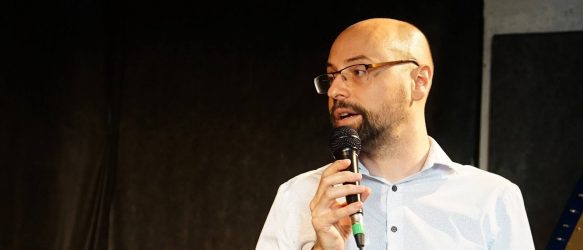Přednášky lingvistky, která se zabývá varietami angličtiny, pragmatikou, analýzou dialogu a historickou jazykovědou, se uskuteční 26. a 27. dubna.
Language choices as ideological statements in medieval and Early Modern BritainWednesday 26 April | 11:00–12:30 | nám. Jana Palacha 2, Praha 1 (CU FA, Room 104) |
|
Written records of medieval Britain show a form of “textual trilingualism” that can be investigated from a socio-historical linguistic point of view to establish what determined language choices in different text-types. This analysis has much to say about the ways in which Latin, French and Middle English were used responding to ideological and political strategies from different groups of text-producers within society. This sociolinguistic profile changed significantly in the Early Modern period, when the conception of the English “nation” came to a different level of maturation, leading to the abandonment of French, and to the adoption of English as national language with subsequent standardization; in this latter phase, the use of Latin in written texts is not discarded, but its symbolic and ideological value also changes. The talk will trace some of the crucial phases in the development of an ideology of national identity as expressed by language choices. |
Affectivity in late-medieval texts and imagesWednesday 26 April | 17:30–19:00 | nám. Jana Palacha 2, Praha 1 (CU FA, Room 104) |
|
Affectivity was a recurrent element in public communication in the Middle Ages, an era in which an emotionbased rhetoric was more important than other strategies to influence and instruct the population. Verbal and visual elements were often employed in synergy, to impress the public and to help the memory. These new communication types are particularly typical of the late Middle Ages, when the mendicant monastic orders introduced new methods of preaching to instruct the congregation, which employed the vernacular, and not Latin – they introduced the belief that the use of a local language, the insertion of comic episodes, and a closer attention to worldly aspects could be more effective than obscure, ritualised liturgies. This synergy emerges very clearly in verbal and visual aspects of religious texts and visual art, where representations of affection, pain and suffering are particularly relevant in the construction of this rhetoric. While aspects pertaining to history of art, literary criticism and iconography have been widely studied, a systematic connection of these factors with the linguistic perspective has hardly been attempted, e.g. through the analysis of specific linguistic structures or the repetition of specific words and figures of speech, which could remind the people of the value of emotional reactions in their progress towards salvation. The talk examines these and other aspects, using examples of late-medieval dramatic and non-dramatic texts set in dialogue with some co-temporary artistic productions, to unravel the mechanisms through which pathos was produced and employed with mainly religious, but also political aims. |
Method in madness? The jungle of English pragmatic and discourse markersThursday 27 April | 9:10–10:40, nám. Jana Palacha 2, Praha 1 (CU FA, Room 217) |
|
The investigation of the uses and functions of discourse and pragmatic markers, as well as of the processes through which they acquire (and sometimes lose) such functions over time has intensified in recent years, but this increase in the number of available studies has not solved some of the main questions connected to the nature and use of discourse markers. Quite on the contrary, the proliferation of studies carried out within different frameworks, and employing different terminology, has made it rather difficult to draw generalisations and see common aspects and trends. The talk will examine some of these developments in the study of Discourse Markers in English, with a particular eye to their historical evolution over documents spanning from the Middle Ages to the present day. It will review some of the main theoretical frameworks in which this study has been carried out and will present data that seems to suggest common trends in the pragmatic exploitation of the potential of some such markers. The talk will also outline the concept of a research agenda that aims at overcoming part of the background questions outlined above. |
|
Gabriella Mazzon´s research interests include varieties of English, pragmatics, dialogue analysis and historical linguistics. She is the author of A History of English Negation (Longman Linguistics Library, London, Pearsons, 2004) and Interactive Dialogue Sequences in Middle English Drama (John Benjamins, 2009). She has edited Studies in Middle English Forms and Meanings (Peter Lang, 2007) and co-edited (with Luisanna Fodde) Historical Perspectives on Forms of English Dialogue (Milano, Franco Angeli, 2012). |







